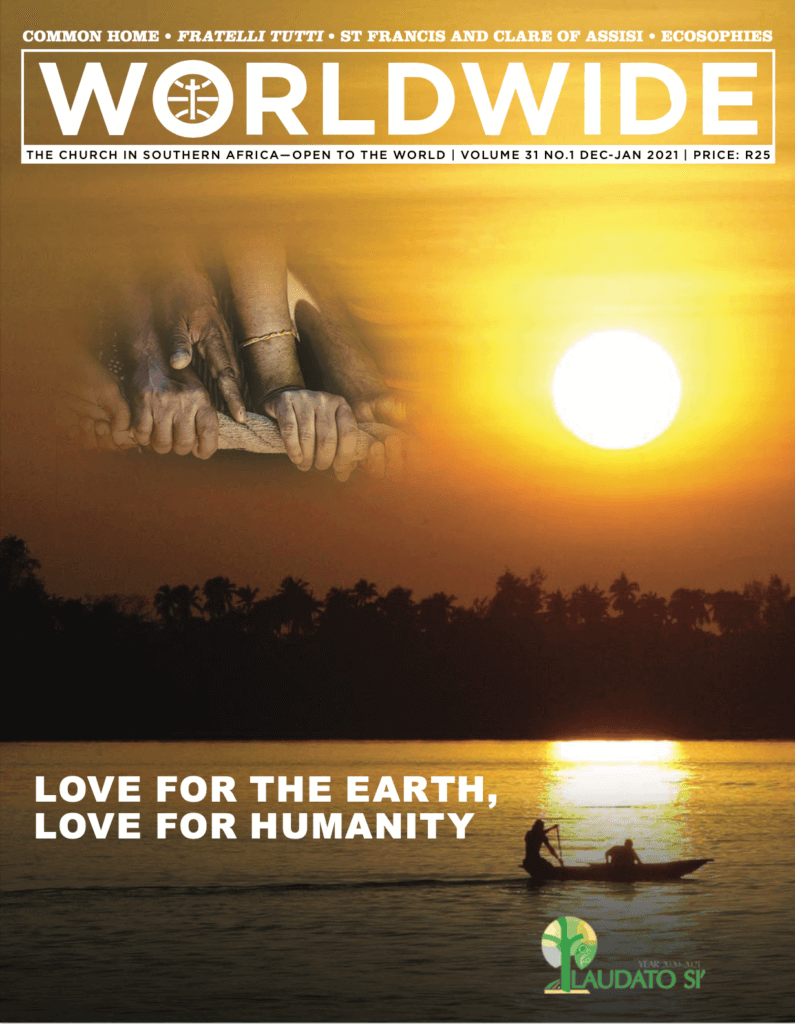
Love for The Earth,
Love for Humanity
The bright light of the rising sun represents the luminosity, the beauty inherent in each human being and our capacity to transform evil into good and to establish authentic human relationships. The closeness of the celebration of Christmas envisions the coming of the Light and Peace for the world, the One that fulfils the greatest aspirations of any person and leads us all to God.
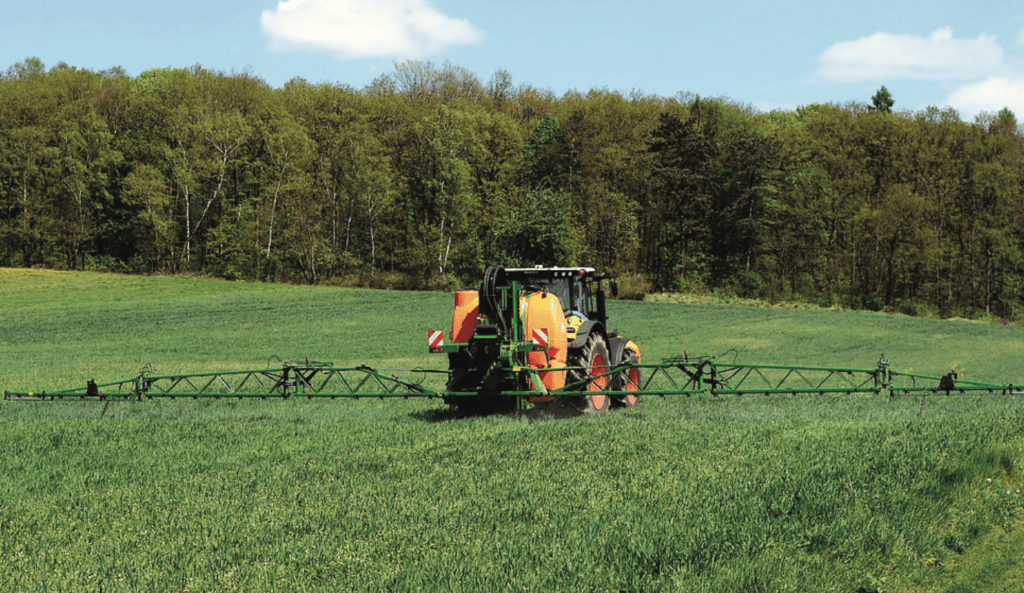
THE WHOLE OF CREATION GROANS WITH PAIN (ROM 8:22)
Voices are growing louder every day, crying hoarsely,
that the planet is facing an environmental crisis
By Archbishop Thomas Menamparampil SDB | Archbishop Emeritus of Guwahati, India
WE HEAR of global warming, acid rain, ozone depletion, climate change, loss of biodiversity, topsoil erosion, tropical deforestation, desertification, underground water depletion and pollution (Welford & Starkey 1996: xi). We pollute the earth with unimaginable indifference. Garbage accumulates in cities worldwide. Millions of tons of rubbish, toxic chemicals, medical waste, fertilizers, and crude oil are dumped, accidentally or deliberately into the ocean. The rubbish that we empty into oceans and rivers and seas moves around the world in currents, depositing the waste as far as the Antarctic and Artic, and on coral reefs (McKenna 2007: 126).
“Unruly growth of cities” is leading to visual pollution and noise, chaotic neighbourhoods, spaces inundated by cement, asphalt, glass and metal (Laudato Si 43). “Urban air grows more and more polluted due to automobile and industrial emissions and threatens the health of millions. Even space is getting polluted; thousands of tons of debris have cluttered the skies for hundreds of kilometres from the earth” (Cummings 1991: 102). In fact, “many cities are huge, inefficient structures, excessively wasteful of energy and water” (Laudato Si 43). Life-sustaining energies are being depleted and degraded (Rassmussen 2005).
A DEHUMANIZING ECONOMY
The economic progress we see is immense, but it has developed an inhuman face. Its focus is not on “human beings and peoples…but merchandise and the market…” (McKenna 2007: 84). We are growing merciless to Mother Earth, tearing apart its ecological garment and Nature’s intricate patterns, imperilling even our very survival (Lachance 1994: xviii).
Edward Echlin calls it the ‘ecological sin’ (Lachance 1994: 106). When we speak of ‘economic miracles’ and boast of economic leadership, we forget that there is a human price to be paid for every step forward, a burden which reduces weaker persons and communities to the status of victims of the so-called ‘national development’. The consequences have been disastrous.
The economic progress we see is immense,
but it has developed an inhuman face.
The “vision of ‘might is right’ has engendered immense inequality, injustice and acts of violence against the majority of humanity, since resources end up in the hands of the first comer or the most powerful: the winner takes all” (Laudato Si 82).
SUSTAINABILITY OF DEVELOPMENT SHOULD
BE EVALUATED IN HOLISTIC TERMS
We speak today more of the ‘needs of development’ than the needs of peoples and of communities, even less of their participation in this endeavour (Hallman 1994: 228). Sustainability of development projects cannot be calculated merely in economic terms. It calls also for spiritual motivation and religious-cultural energy that build up consistency and commitment. Thus, the effort towards sustainability has to be holistic: involving social, spiritual, moral and environmental consciousness and resources (Rasmussen 2005: xiii).
The time has come even for big businesses to judge their goals and become self-critical of the corporate culture that they have accepted as absolute (Welford & Starkey 1996: 10). Many of them do not manifest any grief when they leave behind in developing countries “great human and environmental liabilities such as unemployment, abandoned towns, the depletion of natural reserves, deforestation, the impoverishment of agriculture and local stock breeding, open pits, riven hills, polluted rivers…” (Laudato Si 51)
STRUGGLE FOR SCARCE RESOURCES
LEADING TO VIOLENCE, WAR
It is becoming evident that “once certain resources have been depleted, the scene will be set for new wars…War always does great harm to the environment and to the cultural riches of peoples” (Laudato Si 57). After the experiences of world wars and ethnocides, holocausts and Hiroshi-mas, cold wars and ethnic cleansings, no one can deny that the physical Voices are growing louder every day, crying hoarsely, that the planet is facing an environmental crisis By Archbishop Thomas Menamparampil SDB | Archbishop Emeritus of Guwahati, India The whole of Creation groans with pain (Rom 8:22) The economic progress we see is immense, but it has developed an inhuman face. Fertilizers and pesticides damage soil and kill fish in fresh waters (Welford & Starkey 1996: 61). 12 worldwide dec-jan 2021 worldwide dec-jan 2021 13 power of science alone cannot save us; in fact, it can turn absolutely destructive if it is not controlled by the wisdom of the spirit (Hallman 1994: 37). “Here we see how environmental deterioration and human and ethical degradation are closely linked” (Laudato Si 56).
Oil spills, poisoned rivers and seas, and damaged beaches—we have gone to the point when we need to fear that toxins in food, air and water will irrevocably affect the immune systems of new-born children (Welford & Starkey 1996: 7)
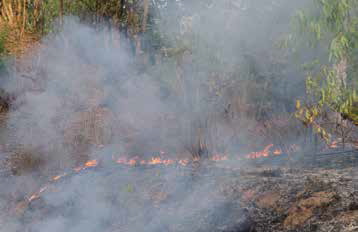
OVER-FISHING, OVER-MINING, DEFORESTATION
As wise persons of every culture have done in the past, we need to care for many species on earth that stand in danger of extinction. Knowledgeable persons warn us against the danger of overdoing things: over-fishing, over-grazing, over-mining, over-straining the soil. They insist on the need to defend soil and its fertility, protecting trees and undergrowth, constructing trenches and contour ridges to prevent erosion, and nurturing lifesustaining elements (Hallman 1994: 253).
Deforestation on a massive scale is the new Hiroshima in our days. It is highest in certain parts of Africa and Asia (Dolzer et al. 2000: 70). Cutting down trees and bushes leads to flooding, continuous soil erosion, ruin of marine environment, and desertification (McDonagh 1990: 21).
THE EARTH, HUMANITY LOSING IMMUNITY
Referring to the environment, responsible people have come to the point of describing the present damage being caused as if the earth is catching AIDS, fast losing its immunity and defence system and life-sustaining ability (MCDonagh 1990: 23). Human beings are affected too.
Today cities are fast falling lower, degrading individuals, communities, entire societies, the environment and all life-forms. When we are hurting our ‘sister earth’ we are hurting our common home, something that we have been doing for the last two hundred years in a big way (Laudato Si 53). We are betraying humanity.
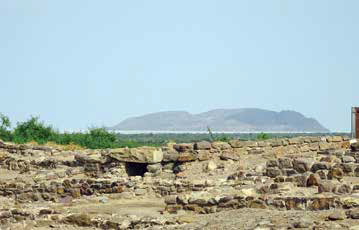
of Nature Valley, India.
LOGGING AND PROFIT-ORIENTED MONOCULTURE
CROPS DAMAGE LONG-TERM INTERESTS
The greater tragedy today is that fertile land is sold out to cash crops for export, or handed over to mighty economic establishments that exploit the local economy and the indigenous people (Dolzer et al. 2000: 67). Governments tend to favour monoculture crops to boost their export and profit-makers rush in to take immediate advantage of the situation. (Whelan et al. 1996: 34).
It is painful to see local leaders, middlemen, poachers, loggers and government and company representatives betraying the trust of the people and selling off priceless patrimonies in the form of cheap timber (McDonagh 1990: 79). The appetite for consumer goods seems to have no limit even in poor countries. People are ready to cut down on health, education and other services in order to spare money for more consumer goods (McDonagh 1990: 4).
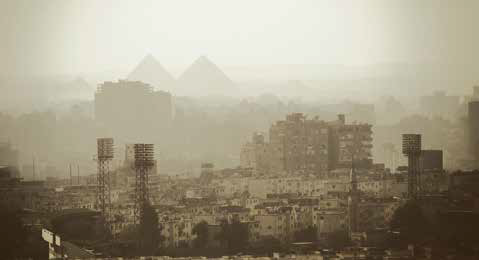
LOSS OF HUMAN SENSITIVITY, THE NEED TO REGAIN
A SENSE OF CO-BELONGING
People are so excited about acquiring the most modern gadgets and other consumer goods that they have oriented all human life to the processes of earning and owning. There is no room left for becoming more human: cultivating human sentiments, compassion of heart, an understanding mind, or gentleness in dealings.
The very tools of wealth-building, the instruments of production, are hunting down those who have brought them into existence. “Modernity devours its own children,” says Rasmussen (2005). The export-oriented ‘economy of exaggeration’ reduces hundreds of thousands of people into the slavery of cheap labour (McDonagh 1990: 33).
Animals will teach you, said Job 12: 7–10. “Everything is related, and we human beings are united as brothers and sisters on a wonderful pilgrimage, woven together by the love God has for each of his creatures and which also unites us in fond affection with brother sun, sister moon, brother river and mother earth” (Laudato Si 92).
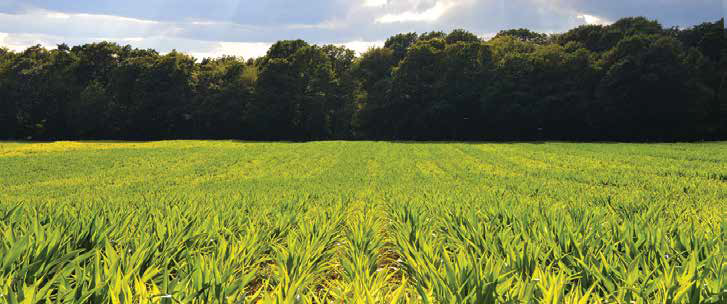
VIOLENCE TO NATURE LEADS TO VIOLENCE
TO HUMAN BEINGS
Unfortunately today we allow advertisers and market-promoters to draw up for us an inflated list of needs. Our eagerness for the goods we see advertised hit the skies. When our expectations are not met, we hastily assign responsibility for it to competing individuals, ethnic groups, or neighbouring countries. People take to violence at the individual, community or at international levels. Likewise, armed resistance is provoked when transnational companies tread on the interests of indigenous people, displacing communities, damaging local markets, destroying inherited values and traditional cultures (Rasmussen 2005: 2).
Many tragedies of our times are related to exaggerated forms of self-interest resulting in accumulation of wealth in the hands of a few and the development of weapons of mass destruction leading to ethnic conflicts, genocide and ecocide (Rasmussen 2005: 85). Pope Francis ends his encyclical Fratelli Tutti invoking human fraternity and calling for a culture of dialogue (Fratelli Tutti 285).
BLESSINGS THAT MODERN SCIENCE HAS BROUGHT
AND DANGER OF EXAGGERATIONS
We do not deny that modern science has raised living standards, produced more reliable medicines, and brought us the many benefits of advanced technology (Cummings 1991: 16). However, it does not provide meaning and purpose to human life and destiny. It does not explain the inner nature of things (Green 1994: 19). In the same way, specialisation, with all its advantages, has led to the fragmentation of knowledge and “loss of appreciation for the whole, for the relationship between things, and for the broader horizon” (Laudato Si 110). The problem is that “We have certain superficial mechanisms, but we cannot claim to have a sound ethics, a culture and spirituality genuinely capable of setting limits and teaching clear-minded self-restraint (Laudato Si 105).
We must begin to listen to persons with a prophetic vision, poets, spirit-driven people who invite us to a new sort of thinking, a new form of logic, ethic and celebration. Let us stir the creative powers implanted into us by the very forces of Nature (Green 1994: 124). There is an ethic written in the subconscious of the human mind that, while using the benefits of Nature, only ‘minimum harm’ should be caused. It is interesting to note that for Albert Schweitzer of Gabon, the cutting of a flower or lopping of a tree were matters for responsible consideration (Cummings 1991: 84).
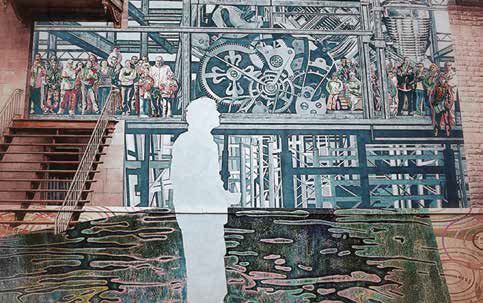
without heart and mind.
THERE IS NO WASTAGE IN NATURE, THERE IS REGENERATION, BALANCE, RELATIONSHIP, HARMONY
There is no wastage in Nature, everything is re-cycled; and new things are generated. Life is regenerated. Animals and vegetation adapt to their surroundings (Green 1994: 80). The best way of showing our gratitude to Nature is to build up a delicate balance in imitation: economic growth, technical and industrial expansion, health improvement, better housing, tender care for the environment, moderate use of natural resources, and a sense of the sacred.
Here is how creativity is best manifested: balancing various sorts of interests and reconciling various interest-groups as Nature does. Can diverse expectations be reconciled? Can we work out some sort of integration between economy and ecology, protection of creation and demands of justice? If Nature remains our model, we have some hope of success (Hallman 1994: 102).
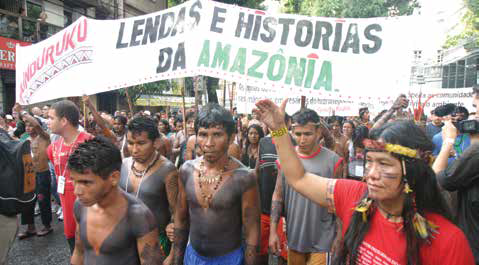
ALL MUST COLLABORATE: GOVERNMENTS, CORPORATIONS, CITIZENS, SCIENTISTS, ECONOMISTS, BELIEVERS
“Honest debate must be encouraged among experts while respecting divergent views” (Laudato Si 61). “No form of wisdom can be left out; it should not ignore religion that can provide motivation for the care of the environment” (Laudato Si 63, 64). In fact, there is a growing consensus among men and women of religion, science, medicine, literature, and arts about the need for the preservation of living systems.
Can intellectuals be a ‘moral voice’ in this confusion of voices? Can they give attention to economic ecology (have a holistic view of the economic activity), human ecology (be concerned with human life, family ), social ecology (concerned with social relationships, structures), cultural ecology (respecting culture in inherited and lived forms), ecology of daily life (bringing quality to living, environment, building styles, showing solidarity), ecology of man (respecting his/her identity) as well? (Laudato Si 141–155). Interdisciplinary, intercultural, interreligious, science-religious dialogues will pave the way for a genuine ‘ecological conversion’ and for effective action (Laudato Si 177–227).
I would like to conclude with the words of the great Indian poet Tagore:
“I asked the tree, speak to me
about God—and it blossomed”
(Rasmussen 2005: 201)
References
Cummings, Charles. 1991. Eco-spirituality—toward a reverent life. Paulist Press, New York.
Dolzer,Rudolf & Thesing, Joseph. 2000. Protecting our environment. Konrad AdenauerStiftung, Sankt Augustin, Germany.
Francis, Pope. 2015. Laudato Si, Vatican City. Green, Lorna. 1994. Earth Age. Paulist Press, New York.
Hallman, David. 1994. Ecotheology. Orbis Books. Maryknoll, New York.
Lachance, Albert. 1994. Embracing the Earth. Orbis Books. Maryknoll, New York. McDonagh, Sean. 1990. The greening of the Church. Orbis books. Maryknoll, New York. McKenna, Megan. 2007. Harm not the Earth. Veritas Publications, Dublin.
Rasmussen, Larry. 2005. Earth community, earth ethics. St. Paul’s Publishers. Makati City, Philippines.
Welford, Richard & Starkey, Richard. 1996. Business and the environment. University Press, Hyderabad, India.
Whelan, Robert, Kirwan, Joseph & Haffler, Paul. 1996. The Cross and the rain forest. Acton Institute for the Study of Religion and
Liberty, Michigan.
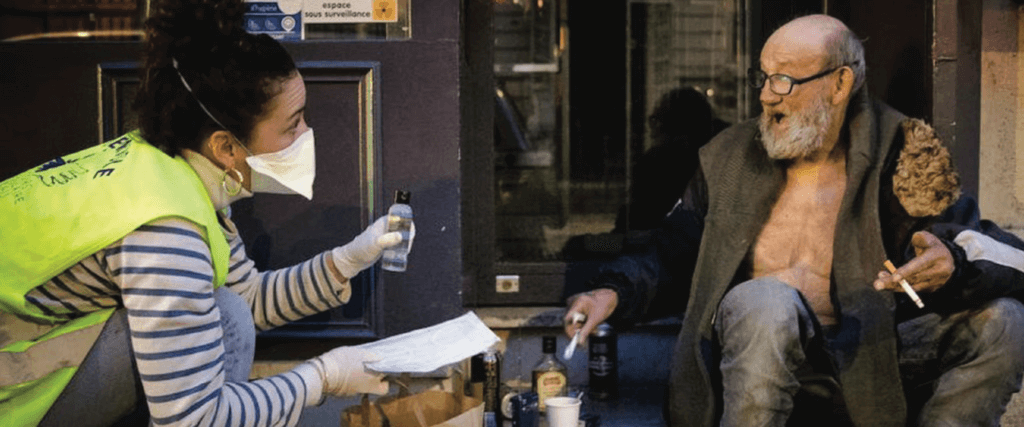
Could the Pandemic Create a Less Exclusive Economy?
THE COVID-19 pandemic has highlighted the global crises that were already there, the recognition of a dysfunctional economy and the driving force behind highly unequal societies—which favour new paths, fears and hopes, but the future remains unknown.
